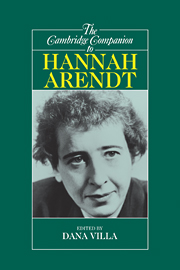Book contents
- Frontmatter
- Introduction
- PART I TOTALITARIANISM AND NATIONALISM
- PART II POLITICAL EVIL AND THE HOLOCAUST
- PART III FREEDOM AND POLITICAL ACTION
- PART IV ARENDT AND THE ANCIENTS
- PART V REVOLUTION AND CONSTITUTION
- PART VI JUDGMENT, PHILOSOPHY, AND THINKING
- 12 Arendt’s theory of judgment
- 13 Arendt on philosophy and politics
- 14 Arendt on thinking
- Select bibliography
- Index
13 - Arendt on philosophy and politics
from PART VI - JUDGMENT, PHILOSOPHY, AND THINKING
Published online by Cambridge University Press: 28 May 2006
- Frontmatter
- Introduction
- PART I TOTALITARIANISM AND NATIONALISM
- PART II POLITICAL EVIL AND THE HOLOCAUST
- PART III FREEDOM AND POLITICAL ACTION
- PART IV ARENDT AND THE ANCIENTS
- PART V REVOLUTION AND CONSTITUTION
- PART VI JUDGMENT, PHILOSOPHY, AND THINKING
- 12 Arendt’s theory of judgment
- 13 Arendt on philosophy and politics
- 14 Arendt on thinking
- Select bibliography
- Index
Summary
Philosophy and politics: a central concern
Hannah Arendt disavowed the title of “philosopher,” and is known above all as a political theorist. But the relationship between philosophy and politics animates her entire oeuvre. We find her addressing the topic in The Human Condition (1958), in Between Past and Future (a collection of essays written in the early 1960s), and in Men in Dark Times (another collection of essays, this one from the late sixties). It is treated in her Lectures on Kant's Political Philosophy, composed during the seventies, and also in the posthumous Life of the Mind, two of three projected volumes of which were complete when she died in 1975. Certainly, Arendt's thought cannot be understood without taking into account her deep suspicion of and equally deep commitment to philosophy in the context of political reflection. For all that, her writings on this abiding preoccupation do not gel into a systematically articulated theory or programmatic statement. Instead, they reflect Arendt's appreciation of what remained for her a “vital tension” – an enigma.
- Type
- Chapter
- Information
- The Cambridge Companion to Hannah Arendt , pp. 261 - 276Publisher: Cambridge University PressPrint publication year: 2000
- 9
- Cited by



